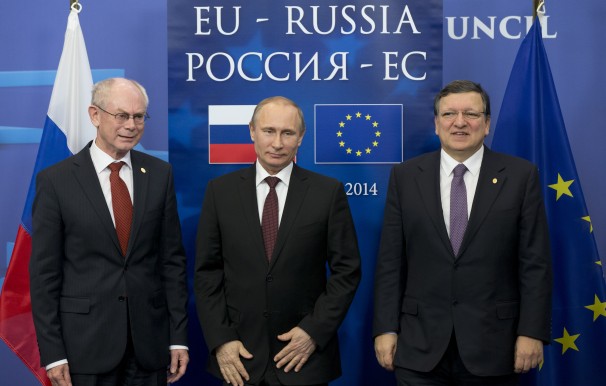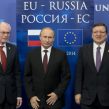
EU-Russia Summit Makes No Progress on South Stream Dispute
Publication: Eurasia Daily Monitor Volume: 11 Issue: 19
By:

On January 28, Russian President Vladimir Putin announced in Brussels that the European Union has agreed to give Russia full access to the OPAL pipeline in Germany, the largest natural gas pipeline in Europe. “We had problems with access to the OPAL gas pipeline, which is the continuation of the Nord Stream gas pipeline on German territory. But now we have reached an agreement on expanding our use of the system from 50 to 100 percent. In other words, we are making progress on even the most difficult issues,” said President Putin when pressed by journalists to show that Russia is resolving some of its problems with the EU. He did not elaborate either on the conditions of a potential exemption from EU laws for the OPAL pipeline or on the effective timeline of such an agreement (Kremlin.ru, RIA Novosti, Voice of Russia, January 28).
Gazprom’s access to the 470-kilometer OPAL pipeline from the Baltic Sea to the Czech Republic has been limited by the EU’s Third Energy Package legislation, which aims to prevent dominant suppliers from simultaneously controlling transport networks. A decision to exempt this pipeline from EU laws may have implications for the ongoing legal dispute between Russia and the EU over the prospective South Stream natural gas pipeline. Gazprom currently controls and operates the OPAL pipeline through a subsidiary of WINGAS. Formally a joint venture between Gazprom and the German Wintershall, WINGAS was fully acquired by Gazprom in December 2013–January 2014 (see EDM, January 17, 20).
Putin’s announcement, however, turned out to be either premature or misleading, since the European Commission has not made a decision yet. In November 2013, the German National Regulatory Authority, the Bundesnetzagentur, proposed a review of the OPAL exemption decision of 2009. “The internal procedure for the Commission decision concerning the OPAL exemption is still ongoing. The Commission has in principle until March 10 to adopt a decision,” said Sabine Berger, Spokesperson for Energy Commissioner Gunter Oettinger, in an e-mailed statement to Jamestown on January 29.
The EU-Russia summit was dominated by the events in Ukraine and, according to observers, was one of the frostiest high-level meetings between Russia and the EU. President Putin expressed frustration with EU’s Third Energy Package, but the European Commission’s President Jose Manuel Barosso brushed it off saying that “some issues in trade and energy have become permanent and we have to agree to disagree” (Press.tv, January 28).
EU-Russia relations have been particularly tense since Moscow put pressure on Kyiv to turn down a free trade agreement with the EU in November 2013, which led to widespread anti-government protests in Ukraine. But several major energy problems have been looming for years, including an antitrust probe against Gazprom that the European Commission started in 2012, and the latest row over Russia’s agreements with six European countries on South Stream that are in violation of EU laws. The Commission requested that Austria, Bulgaria, Croatia, Greece, Hungary and Slovenia renegotiate these bilateral agreements with Russia. Serbia does not have EU membership status, but it is a member of the EU-backed Energy Community.
Russia’s position on the dispute is diametrically opposed: “The European Commission should adapt its internal legislation to the bilateral agreements Russia signed with six EU countries for building the South Stream pipeline, and not the other way around,” Russian Ambassador to the EU Vladimir Chizhov said in Brussels on January 13 (EurActiv, January 14).
EU Energy Commissioner Gunter Oettinger has agreed to negotiate with Russia on behalf of the concerned countries. He met with Russian Energy Minister Alexander Novak in Moscow on January 17, but the negotiations failed to produce results as the two sides simply registered their differences—the EU wants South Stream to comply with its laws, while Russia wants the EU to adapt its laws to South Stream. “There was no compromise on even a single point,” a source told Kommersant-Ukraine. Novak and Oettinger only agreed to create a working group to address technical and legal issues of the pipeline with particular attention to environmental and antitrust laws (Kommersant.ua, Natural Gas Europe, January 20).
The Russian media, however, was quick to claim that the European Commission had given up forcing the EU member states to reconsider agreements with Gazprom for the construction of the South Stream gas pipeline, citing a statement by Russian Deputy Energy Minister Anatoly Yanovsky. Some newspaper titles even stated that the EU has given a green light to South Stream because of its critical importance for European energy security and the successful advocacy of the East European transit countries (Vedomosti, Lenta.ru, RT, January 20).
The first meeting of the newly established working group co-chaired by Russia’s Anatoly Yanovski and Dominique Ristori, head of the European Commission’s General Directorate for Energy, took place in Brussels on January 23. The process is going to be lengthy because EU laws require Gazprom to give up its controlling stake in the pipeline, reserve pipeline capacity for other gas suppliers and allow the local regulators to determine the tariffs—three provisions that Russia refuses to accept (RIA Novosti, EurActiv, January 24).
Russian officials say they have recognized the OPAL pipeline as a subject to EU’s Third Energy Package as it is built on EU territory, therefore they have requested a flexible application of this legislative act to the OPAL pipeline only. But in their opinion, the South Stream project is a major trans-border pipeline that needs to be subjected to international law, which supersedes EU regulations (Interfax, January 14).
As the EU-Russia Summit evidently had little time to deal with South Stream, pipeline construction is starting in Bulgaria and Serbia in the spring. On January 29, South Stream Transport B.V. signed the pipe supply contracts for the first of four gas lines to be laid across the southern Black Sea. The offshore section will run for 931 kilometers (578 miles) from the Russkaya compressor station on the Russian coast and make landfall on the Bulgarian coast near the port of Varna (Investor.bg, January 16; South-Stream.info, January 29).




